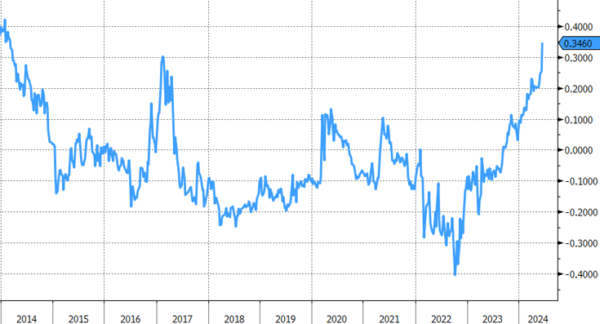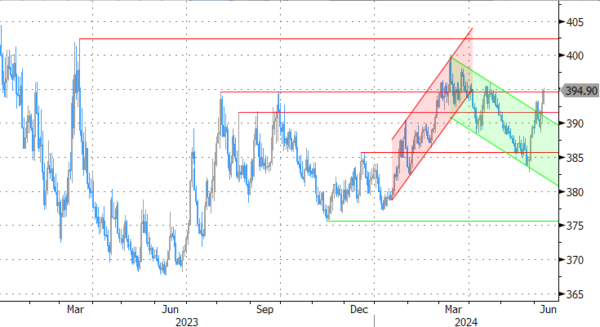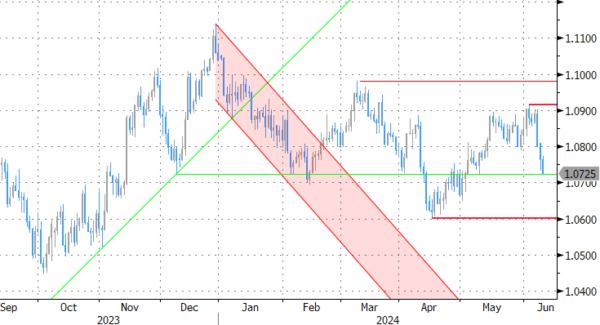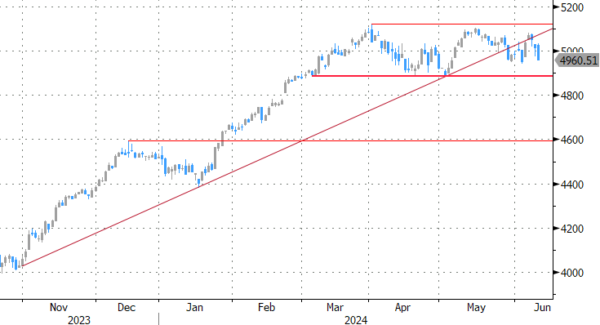Markets
Euro weakness remains name of the game in the wake of French President Macron’s snap election call as his coalition got whacked in EU elections. ECB comments played a role as well. EUR/USD set a new sell-off low around 1.0730 from starting levels near 1.0775. Macron’s proposal to join forces on the center(-left/right) aisle of the political specter to boost changes at the June 30 ballot fell in deaf man’s ears. The extreme-right on the contrary does seem to be readying that same strategy as Le Pen’s Rassemblement National wouldn’t mind teaming up with Reconquête. Simultaneously, there were rumors that President Macron would resign though these were later denied by a person close to Macron. The President is set to hold a press conference to set out his campaign. The return of European political risk premia lifted credit spreads for a second session straight. The 10-yr OAT/swapspread hit 38 bps intraday for the first time since early 2014. The level compares to 25 bps last Friday. The weaker European credits feel the contagion. The 10-yr BTP/swapspread widened for example from 112 bps to 122 bps. Spanish (54 bps) and Belgian (36 bps) widened only 3 bps with the likely shift to a more orthodox fiscal policy helping BGB’s outperform following this weekend’s national and regional elections. ECB Villeroy sounded somewhat more dovish than some of his colleagues. He confirmed that there was no preset rate path for the second half of the year but labelled further rate cuts as the decisive orientation. This contrasts somewhat with others calling for a restrictive monetary policy before raising the victory flag on inflation. ECB chief economist Lane said that last week’s rate cut was timely and that more cuts are possible if enough progress to the 2% target is made. The front end of the German yield curve outperforms significantly today with German yields sliding up to 7.2 bps (2-yr). Market positioning played a role as well as markets reduced the probability of a September ECB rate cut to only 50% yesterday after Lagarde suggested that the policy rate cut could be kept stable for consecutive policy meetings.
EUR/GBP extended losses from 0.8460 to 0.8420. A disappointing labour market report – admittedly with more stubborn wage pressure – only triggered a kneejerk response in GBP. UK Gilts nevertheless rallied with the front end underperforming as well. UK yields lost 5.4 bps (2-yr) to 1.7 bps (30-yr). The same reasoning goes for the Bank of England as market positioning recently turned much more hawkish (only rate cut only discounted by November).
News & Views
Czech inflation was unchanged in May from April (0% M/M). After an unexpected up-tick from 2% to 2.9% Y/Y last month, inflation declined back to 2.6% Y/Y. The Czech Statistical Office reported rather insignificant moves in most divisions of the consumer basket, often offsetting each other. Prices of goods decreased by 0.2% M/M and prices of services increased 0.2% M/M. Compared to the same month last year prices of goods in total and of services respectively went up by 0.9% Y/Y and 5.3%. The Czech national Bank (CNB) said that annual inflation was just 0.1 ppt higher in May than in its spring forecast. This small positive difference was mainly driven by volatile food prices. Growth in administered prices was also somewhat stronger than forecasted. Significantly lower growth in fuel prices and a further slight drop in core inflation (2.5% vs 2.7% forecast) had the opposite effect. The CNB maintains its assessment that inflation will be close to the 2% target this year. The Czech 2-y swap yield declined 7 bps as markets still ponder whether the CNB will cut rates by 25 or 50 bps later this month, with the former still seen as more likely. the krone weakened from EUR/CZK 24.65 to 24.73.
Sentiment among US small businesses improved in May to the strongest level Ytd. The confidence index of the National Federation of Independent Businesses (NFIB) rose from 89.7 to 90.5. Even so, the index holds below the historical average for the 29th month. The uncertainty index rose nine points to 85, the highest level since November 2020. On the positive side, owners’ plans to hire improved from 12% to 15%. A net of 28% (from 26%) also plans price hikes. On a downbeat note, 6% of owners reported that financing was their top problem, up from 4% in April and the highest level since June 2010. 22% of owners still reported that inflation was their single most important problem in operating their business, unchanged from April and the top business problem among owners. The balance of expected profit trends (-30%) remains deeply negative and deteriorated further.
Graphs
10-yr OAT/swapspread rises to highest level since early 2014 in the run-up to French elections
EUR/HUF arrives at potentially pivotal level in determining next MNB policy move
EUR/USD: no saving the euro for now. EU political risk gets embedded in FX rate
EuroStoxx50: deteriorating EU risk sentiment pulls index lower within sideways Q2 trading range




